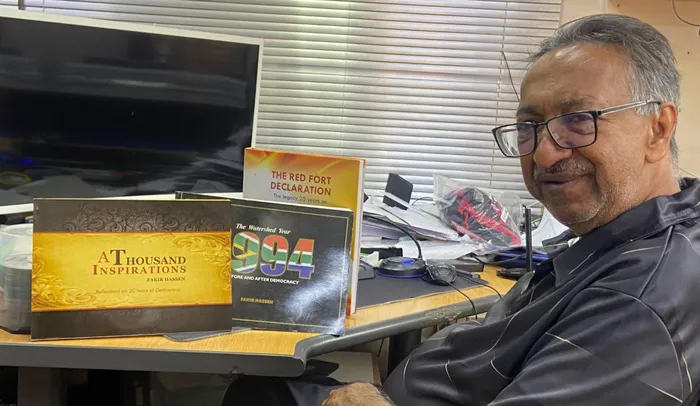
Fakir Hassen will be launching 46 books in commemoration of the 70th anniversary of Lenasia in Gauteng.
Image: Supplied
AT AGE 72, Fakir Hassen has woven a rich tapestry of life experiences, showcasing the history and culture of South Africa’s Indian community through his work as a reporter and career at the South African Broadcasting Corporation (SABC) which spanned more than three decades.
Hassen, who resides in Johannesburg, also wrote 37 books and is currently working on “the biggest project of my life” in commemoration of the 70th anniversary of Lenasia, which was established during apartheid as a forced Indian group area.
He intends on simultaneously launching 46 books that comprise articles he wrote and published in the Lenasia Times since it was established in 1976. The books will be launched as the finale to the anniversary celebrations in November.
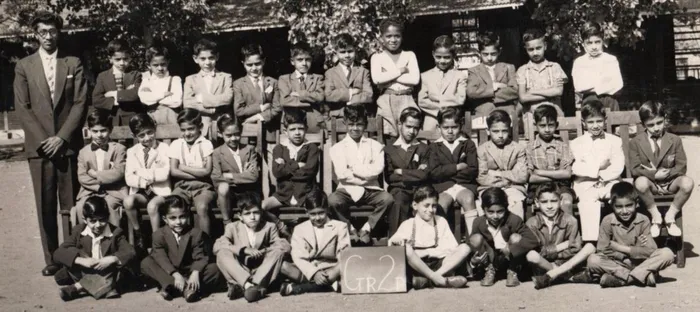
Hassen (middle row, seventh from left), with his Grade 2 class at Pretoria Boys Indian Junior School in 1960.
Image: Supplied
Hassen, a content contributor to the POST for more than 35 years, shared his journey.
Hassen, the eldest of three children, grew up in Marabastad in Pretoria.
His paternal grandfather, Hassen Bera, came to South Africa from India.
“My paternal grandmother was born in Marabastad. My mother Jubeda's parents lived in India, and she was sent alone on a ship to South Africa to get married, which had been arranged.”
His mother was a housewife and his father, Essop Hassen, was a night porter at a hotel.
“We did not spend much time with our father as he slept during the day and worked during the afternoons. However, when we got to spend time with him, we used to get dressed up and go to the cinema to watch the latest Indian movies every Saturday afternoon. This is where I developed my passion for movies, and later started doing reviews for publications.
“During the week, there was not much entertainment available, as we did not have a television. However, we entertained ourselves by playing games. We played until it got dark, and only went home when our parents called us,” he said.
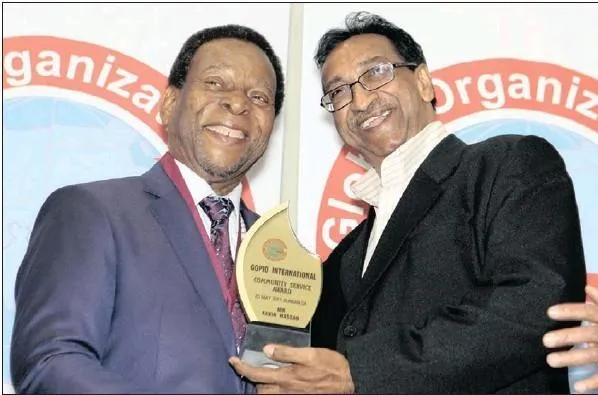
He was one of the recipients of a Community Service Award from GOPIO International. He was presented the award by the late King Goodwill Zwelithini.
Image: Supplied
He started Class 1 (Grade 1) at age 6 at Pretoria Boys' Indian Junior School in 1959, and thereafter attended Pretoria High School. He matriculated in 1970.
“In 1968, our family, and many others, were forcibly removed from Marabastad and sent to Laudium due to the Group Areas Act. I remember travelling by bus to and from school every day. Thankfully, it was an efficient service.”
While at school, he developed a passion for writing.
“English was my favourite subject. I loved writing essays and got good marks. I found writing to be enjoyable and I was appointed as the editor of the high school’s magazine.”
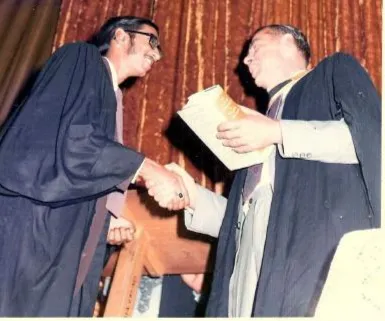
Hassen being presented with the prize for the best final year student at the Transvaal College of Education in 1973.
Image: Supplied
He attended the Transvaal College of Education and graduated with a teaching diploma in 1973.
Hassen specialised in English, Afrikaans and maths for primary school level.
“One of my highlights was receiving a prize for being the best final year student.”
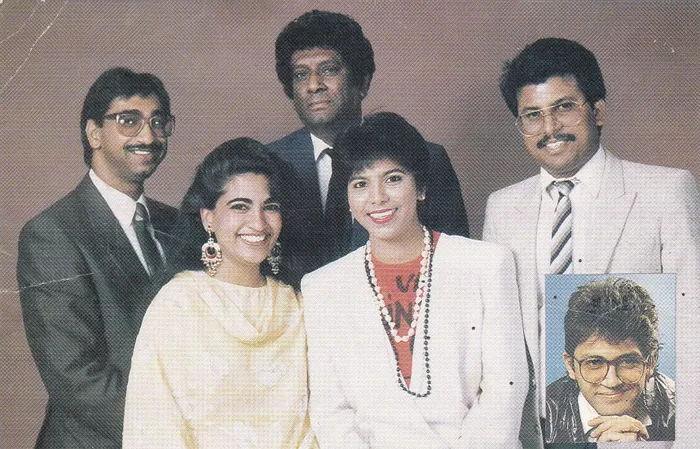
Hassen, left, with some of his colleagues at Radio Lotus. He is seen with, front, Zakia Ahmed and Amitha Anand, and at the back, BK Chinnah and Sergie Naidoo. Insert, Fareed Dockrat.
Image: Supplied
Hassen said he taught at Bree Street Primary School in Johannesburg from 1974 to 1978.
“I taught a Standard 5 (Grade 7) class. In those days there were no less than 50 children in a class and you had to teach every subject. There were no specialist teachers like these days. One of my memories as a teacher is of a circuit inspector who used to sit in the teachers’ classrooms and assess their performances. He sat in my classroom and then left after about 10 minutes.
“I was called to the principal’s office and the inspector told me I was a good teacher. However, I asked him, with all due respect, how he could assess me by only sitting in the classroom for 10 minutes. I said that could have been my best day, or could have been one of my worst days. He was angered and asked how dare I challenge him. From that day, he made my life difficult and gave me bad reviews, even though the principal knew I was a good teacher,” he said.
Hassen said while he wanted to resign ,he could not as he had a bursary from the then-Department of Indian Affairs, and had to fulfil his four-year contract.
He said during the final year of teaching, an opportunity arose.
Hassen said he was approached to write for a magazine, Fiat Lux.
“The magazine was an initiative of the Department of Indian Affairs and was published monthly in Durban. They wanted me to write as the representative for the then-Transvaal province.
“There were many small areas coming up where Indians had been moved due to the Group Areas Act. I wrote about what the government was doing for the Indian community, but also I did features on every town that Indians were moved to in the then-Transvaal. It is one of my proudest achievements,” he said.
Hassen said he also wrote for a weekly newspaper, the Lenasia Times, which was established in 1976.
“I wrote simultaneously for the Lenasia Times, which was started by a friend, Waheed Camroodeen, who is now late. The newspaper started out with just four-pages but it grew over the years. I wrote community news and covered many functions. Lenasia was a bustling community, and I remember attending 12 functions over one weekend. That was a record for me. To this day, I still write for the newspaper.”
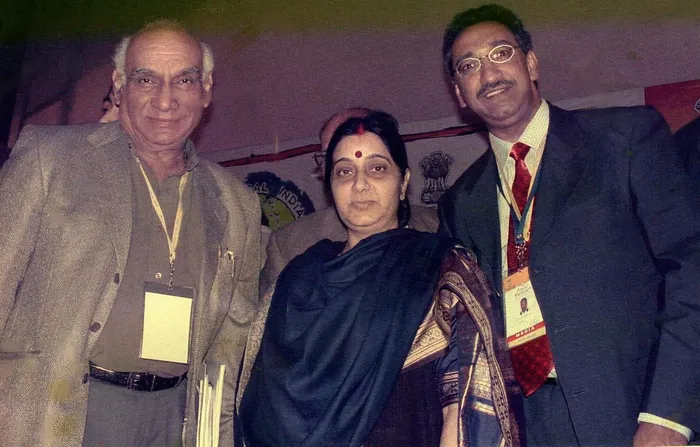
With legendary filmmaker Yash Chopra and India’s Minister of Broadcasting Sushma Swaraj, who are both now late. Hassen delivered a paper at the inaugural Pravasi Bhartiya Divas conference on media in the diaspora in New Delhi in 2003.
Image: Supplied
Hassen said during this time he was head-hunted by the SABC who were looking for an “Indian reporter”.
“They made me an offer to become the first Indian reporter in the radio news division. At the time you would be seen as a traitor if you joined a government news organisation. This posed a challenge for me. Do I join and take the risk of being called a ‘sell-out'?
“While writing for the Lenasia Times, I attended and reported on meetings of political parties such as the Transvaal Indian Congress. I then sought advice from three of its leaders about the offer from the SABC. They told me I should take it as they needed someone on the inside to try to make changes.
“I don't think I succeeded in bringing about the changes they wanted, but as a reporter, I believe I made changes where things that involved the Indian community were now being reported on at a national level. I am quite proud of this change,” he said.
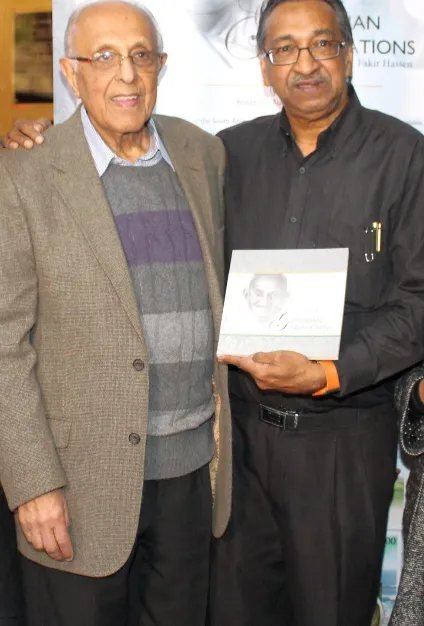
With the late veteran freedom fighter Ahmed Kathrada. Kathrada was the keynote speaker at the launch of Hassen’s book, 101 Gandhian Inspirations, in 2016.
Image: Supplied
Hassen said he was appointed as a chief sub-editor in radio news at the SABC's studio in Auckland Park, in Johannesburg, in 1983.
Two years later, he became the station manager of Radio Lotus (now Lotus FM) based in Durban.
“When the station initially started, it broadcast for a few hours during the day. However, the SABC wanted the station to run all day. They approached me to be the station manager. It was initially meant to be a three-year contract, but I stayed with the station for 10 years.
“In 1995, the now late Govin Reddy, who was appointed as the CEO of SABC Radio, approached me. We entered democracy and the SABC started making changes, including to its management board. Govin asked me to return to Johannesburg as there were plans to revamp the educational radio service. I told him the only experience I had in education was as a teacher for four years.
“He said the education department was developing a new curriculum and the SABC was revamping its educational programmes. There used to be an African language station called Skool Radio. It was to supplement the classes for African schools at the time.
“In 1996, I started as the head of education radio. There were initial challenges as we started something new. I was responsible for appointing teams at every station. In the process, we also assisted community radio stations that were coming up, and operating parallel to education television.
“Then came the process where education radio and television were to be merged. At the time, there was also a head of education television, so one of us had to give up our position, which I offered to do. I never regretted this decision,” he said.
Hassen was thereafter appointed as a compliance officer at the SABC.
“The Independent Communications Authority of South Africa (Icasa), as it is now known, required the SABC to have a compliance officer. My responsibility included ensuring all complaints received from the public were dealt with. I served in this position for 15 years until my retirement in 2016.”
Hassen added that during his time at the SABC, he continued to provide news content for various publications, both locally and internationally, such as news agencies in India.
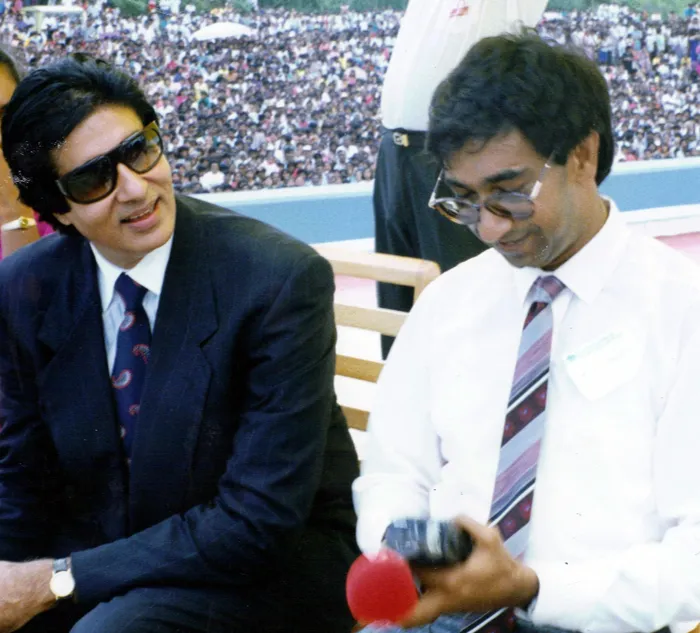
Hassen with the legendary actor Amitabh Bachchan after they landed on the roof of the Chatsworth Centre in a helicopter to address 15 000 fans on the streets.
Image: Supplied
Hassen published his first book, 150 Bollywood Encounters, in 2010.
“I initially planned to write my first book to commemorate the 150th anniversary of the arrival of Indian indentured labourers in 1860. But as I started searching through my archives, I found a lot of Bollywood material I gathered over the years. While at Radio Lotus, I met many Bollywood stars at international events, and when they visited South Africa. I decide to write 150 Bollywood Encounters first. The response to the book was phenomenal. I had only printed 100 copies and it sold out quickly. This prompted me to do a bigger version, '250 Bollywood Encounters', in 2011.
“By 2014, the original book plan was back in action as the country had celebrated 20 years of democracy. ‘A Thousand Inspirations’ was born. It documented the achievements of the Indian community over decades despite the adversities and challenges of apartheid.
“Since then I have written 37 books, including a memoir of my 35 years of service in various positions at the SABC. I have written other books about my own journey, as well as on people such as Mahatma Gandhi and Nelson Mandela,” he said.
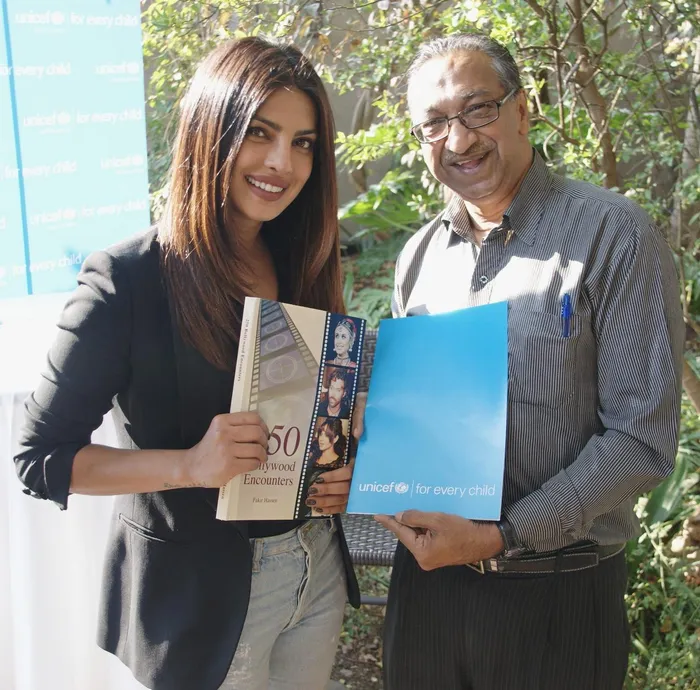
Hassen with internationally renowned actress and UNICEF Ambassador Priyanka Chopra. She exchanged books with Hassen during one of her visits to Johannesburg in 2017.
Image: Supplied
Hassen said he was now working on "the biggest project of my life”.
“In commemoration of Lenasia being established 70 years ago this year, I initially decided to do a book with all the headlining stories published in the Lenasia Times. However, after I gathered stories from all the front pages, I realised it would not be of much value because inside the newspapers were other great stories, such as the religious and sporting organisations that came up, which could not be excluded. I decided to do 46 books, with each one covering stories from every year since the newspaper was established.
“In addition, all my writings are based on a single premise, which is that any knowledge and experience I have gained in my lifetime are useless if it is not shared with others. By keeping it to myself, I will effectively render it extinct but by sharing it, such knowledge and experience will multiply exponentially and serve mankind further, perhaps even in perpetuity, through the written word,” he said.
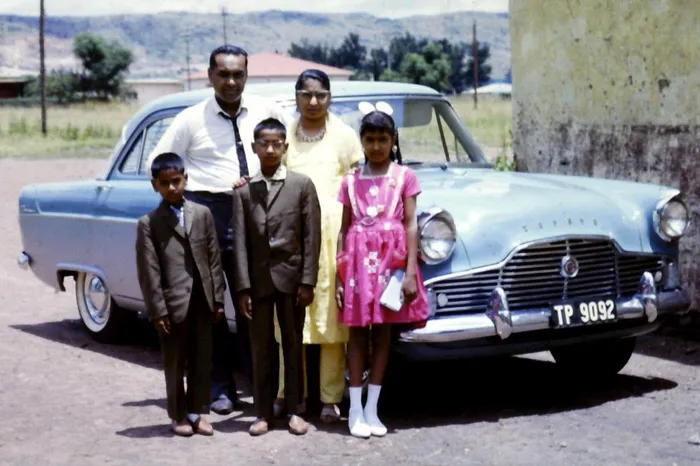
With his parents Essop and Jubeda Hassen, and siblings, Sabhir, now late; and Rashida on an Eid day.
Image: Supplied
Over the years, Hassen has been the recipient of numerous recognitions, locally and internationally. Among these include being inducted into the Liberty Radio Awards Hall of Fame, receiving the Indian of the Year Award from the Uttar Bharat Sewa Samaj (UBHAS), and a Community Service Award from Gopio International.
Hassen and his wife, Zarina Choonara, celebrated their 50th wedding anniversary on August 8. They have two children and two grandchildren.
He said while he continued to contribute to various publications, by writing articles and capturing pictures at events, he spent his free time watching international news on television, and Indian movies at the cinema.
“I can honestly say that I have watched almost every Indian movie that has been released in South African cinemas.”
Related Topics: